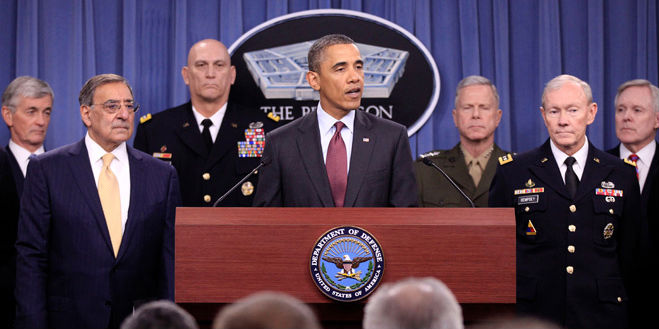Consider the following:
Videos by Rare
- What if I told you there’s a government program which will cost taxpayers more than Obamacare will over the next ten years?
- What if that program was just one function of a sprawling government agency which has not been audited in two decades?
- What if that agency was the third-largest contributor to our $17 trillion national debt, which breaks down to $55,000 per citizen?
What if the same agency wasted tens of billions of dollars annually on projects and goods unrelated to its mission? (Like a study on “whether men holding pistols are viewed as taller, stronger and more masculine than those wielding objects such as saws, paint brushes and caulking guns.” Or “a conference that included a session titled ‘Did Jesus Die for Klingons too?’” Or “research on what the behavior of fish can teach us about democracy.”)
- What if it also regularly paid hundreds of times the market value for commonplace items?
- And squandered billions more on outdated equipment which just doesn’t work?
- And prioritized cuts in vital programs rather than big-budget flops?
- And lost hundreds of millions to waste and corruption in foreign programs?
- And destroyed valuable equipment rather than repurposing it?
- And blew big bucks on cross-promotions with superhero movies?
- And gave high-dollar contracts to companies known to engage in fraud—contracts totaling more than $1 trillion in the last ten years?
- And built buildings which will never be occupied?
- And reported to Congress that it simply couldn’t account for $1 trillion (yes, trillion) it had spent?
- And yet it still plans to spend the equivalent of the entire GDP of Sweden on a single purchase over the course of the next fifteen years?
What if this agency regularly and intentionally doctored the books to hide these wasteful practices from taxpayers?
For any fiscal conservative, the conclusion must be that this incredibly wasteful, deceptive, and nonproductive government agency is seriously overdue for audits, possibly criminal charges, and huge—massive—ginormous spending cuts. Right?
Right.
That program was the War in Iraq. That agency is the Department of Defense. That spending is war spending. And the DoD does indeed waste absurd amounts of money on unrelated projects galore, incredibly overpriced purchases, obsolete weaponry, poor prioritization, nation-building projects, destroying equipment, promoting the recent Superman flick, fraudulent contractors, empty buildings, unaccountable spending, and planes that cost as much as Sweden’s GDP. The DoD has been caught doctoring the books on a grand scale.
Yes, war really is just one more big government program: It’s costly. It’s wasteful. It’s poorly managed and rife with incompetence and fraud.
And here’s the worst part: All this spending doesn’t even really accomplish the Department of Defense’s ostensible goal of, well, defense.
Take the history of U.S. intervention in Afghanistan as an example. During the rise of the brutal Taliban regime in 1996, the New York Times reported, “the Taliban emerged from the chaos of a war between American proxy warriors and Soviet troops, and is still supported by the arms network of American allies created to challenge Soviet power.”
Of course, less than a decade later the U.S. government once again got involved in Afghanistan to remove the very same Taliban, and we’re still there today, spending like crazy. In the middle of the Cold War, intervening in Afghanistan against the Soviets seemed like the obviously right choice: It would allow self-determination, halt the march of communism, and keep the Evil Empire in check.
Now? Not so much.
Unfortunately, lessons like this are easily forgotten. With each drumbeat marching us into a new war, we quickly forget questions steadier heads might ask about the motives of those calling for war, the clarity with which we’ve identified the good guys (if there are any), or the likelihood our involvement will even help.
As Afghanistan has shown time and again, dropping bombs into messy situations we very clearly do not understand will never be an effective, moral, or practical plan, no matter how much we wish it might be.
It will always be a wasteful big government program.
Former Bush and Obama Defense Secretary Robert Gates has remarked that a “smaller military, no matter how superb, will be able to go fewer places and be able to do fewer things.”
He’s right… and that’s exactly what we need.
As D.C. continues trying to police the world—with war in Afghanistan; drone campaigns and other interventions in Pakistan, Yemen, and elsewhere; and whatever the heck we’re doing in Iraq—fiscal restraint at the Pentagon has never been more vital.
The more we give the DoD a free pass on its appalling lack of accountability and basic fiscal discipline, the more we encourage it to engage in ineffective, unsafe, and illegal military interventions.
National defense is the primary function of government. But considering the exorbitant cost of war, shouldn’t we have some sort of reasonable assurance that the costs are worth it? How many Americans today think the cost of what our Pentagon spends is worth it?
When our children and grandchildren are picking up our tab, will they look back and think it was worth it?



